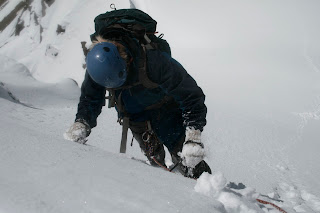Many PC students want to learn Spanish both because it’s a
local language and because it’s spoken widely in some of the most intriguing
and scenic places in the world, from Latin America to Spain to the Philippines. Adventure Ed student Brian Andersen wanted to
improve on the informal Spanish he picked up
when he spent time traveling in South America prior to coming to
Prescott College.
“One of my goals of my education is to be able to lead
international expeditions, and I feel like Spanish is a incredibly important
language if I am going to do that,” Brian noted in his application to pursue an independent study course while in Montañita, Ecuador. He planned his spring ’11 semester carefully
so that he could earn a full semester of PC credits while he was abroad. He began his stay in South America in the International Mountain Expedition block course; enrolled in an intensive Spanish
language school for eight weeks in Montañita where he lived with a local family;
and ended his semester with a three-week climbing course, in Peru, offered by the
School for International Expedition Training.

The Learning Commons’ World
Languages Initiative helped Brian pick a high-quality language school in
Ecuador and write the IS learning contract so that he would receive PC credits
for the time he spent focusing on learning Spanish. Learning Commons’
Coordinator Nancy Mattina served as Brian’s mentor for the four-credit course.
Brian found the language school in Montañita through a web
search that led him to Lingua Schools at www.linguaschools.com. Once at the school, he studied grammar and
conversational skills for five hours a day, five days a week in a small group
and often one-on-one with the instructor. He spent downtime learning to surf with the local beach crowd, which gave him ample
opportunity to converse in Spanish while having a great outdoor experience. His homestay was arranged by the school and he
became quite attached to his host family, especially the family's father (pictured above with Brian).
“Studying
Spanish in Montañita
was one of the most wonderful experiences of my life,” says Brian. “The day
went something like this: wake up, go to
school, go surf, go back to school, return to the ocean, eat dinner with my
family, go dancing, go to sleep. Then, wake up and do it all over
again.”
For more information on how to set up your IS in a
Spanish-speaking country, email Nancy Mattina to make an appointment at least two months before you
plan to travel.







